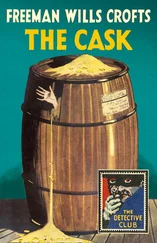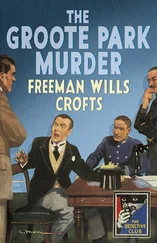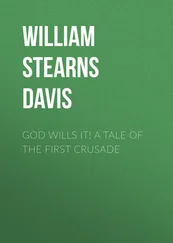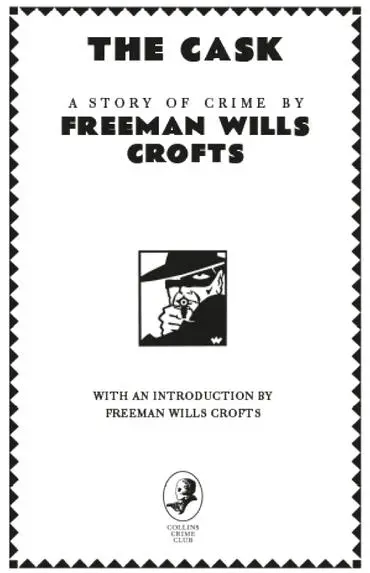
Published by COLLINS CRIME CLUB
An imprint of HarperCollins Publishers Ltd
1 London Bridge Street
London SE1 9GF
www.harpercollins.co.uk
First published in Great Britain by The Crime Club by W. Collins Sons & Co. Ltd 1921
Copyright © Estate of Freeman Wills Crofts 1921
Introduction © Estate of Freeman Wills Crofts 1946
Cover design © HarperCollins Publishers Ltd 1920, 2020
A catalogue copy of this book is available from the British Library.
This novel is entirely a work of fiction. The names, characters and incidents portrayed in it are the work of the author’s imagination. Any resemblance to actual persons, living or dead, events or localities is entirely coincidental.
All rights reserved under International and Pan-American Copyright Conventions. By payment of the required fees, you have been granted the non-exclusive, non-transferable right to access and read the text of this e-book on screen. No part of this text may be reproduced, transmitted, down-loaded, decompiled, reverse engineered, or stored in or introduced into any information storage and retrieval system, in any form or by any means, whether electronic or mechanical, now known or hereinafter invented, without the express written permission of HarperCollins.
Source ISBN: 9780008190521
Ebook Edition © September 2016 ISBN: 9780008190538
Version: 2020-01-17
TO
DR ADAM A. C. MATHERS,
IN APPRECIATION OF HIS KINDLY
CRITICISM AND HELP
Table of Contents
Cover
Title Page
Copyright
Dedication
Introduction
Part I: London
Chapter I: A STRANGE CONSIGNMENT
Chapter II: Inspector Burnley on the Track
Chapter III: The Watcher on the Wall
Chapter IV: A Midnight Interview
Chapter V: Felix Tells a Story
Chapter VI: The Art of Detection
Chapter VII: The Cask at Last
Chapter VIII: The Opening of the Cask
Part II: Paris
Chapter IX: M. le Chef de la Sûreté
Chapter X: Who Wrote the Letter?
Chapter XI: Mm. Dupierre et Cie
Chapter XII: At the Gare St Lazare
Chapter XIII: The Owner of the Dress
Chapter XIV: M. Boirac Makes a Statement
Chapter XV: The House in the Avenue de l’Alma
Chapter XVI: Inspector Burnley Up Against It
Chapter XVII: A Council of War
Chapter XVIII: Lefarge Hunts Alone
Chapter XIX: The Testing of an Alibi
Chapter XX: Some Damning Evidence
Part III: London and Paris
Chapter XXI: A New Point of View
Chapter XXII: Felix Tells a Second Story
Chapter XXIII: Clifford Gets to Work
Chapter XXIV: Mr Georges La Touche
Chapter XXV: Disappointment
Chapter XXVI: A Clue at Last
Chapter XXVII: La Touche’s Dilemma
Chapter XXVIII: The Unravelling of the Web
Chapter XXIX: A Dramatic Dénouement
Chapter XXX: Conclusion
About the Book
The Detective Story Club
About the Publisher
MESSRS COLLINS have done many things which have delighted me—notably their acceptance of the MS of The Cask in the first instance—but few have given me greater pleasure than their decision to include this book in their Pocket Classics Series. It is a great honour to confer on a detective story.
They have asked me to write a foreword, describing briefly how the book came into being, and this is it.
Well, unhappily for the foreword, nothing could have been more prosaic and uninteresting. I did not retire from the world, and with a plentiful supply of wet towels for my head and strong coffee at two-hourly intervals, cover the floor of my room with sheet after sheet of closely-written manuscript. Instead, I got ill and had a period of convalescence. During this period I became so bored that I didn’t know what to do, and to try to fill the time I asked for a pencil and a few sheets of notepaper. I began to write down what seemed the most absurd and improbable things I could think of. Before I knew what was happening, a whole morning was gone.
This was eminently satisfactory, and I was even more pleased when the second morning passed equally quickly. At last a chapter was finished. As a sort of joke I read it to my wife. She expressed delight (unhappily, mingled with amazement). I remember so well finishing up: ‘Harkness and the cask were gone!’ and her enthusiastic approval. However, her praise made me persevere, and I continued writing till I was well enough to take up again my normal job of railway engineering.
The manuscript was put away and almost forgotten, but some time later I re-read it. Rather to my surprise it seemed as if something might be made of it and I began to revise and re-write. In this a kindly neighbour (to whom I dedicated the book) gave me immense help. I read each chapter to him as it was finished, and he would stop me and say: ‘I don’t like that. No one but a complete idiot would have done any such thing. You’ll have to alter it.’ Most salutary: it made the book a deal better than it would otherwise have been.
At last it was finished, and in fear and trembling, yet with a thrill, I sent it to Messrs A. P. Watt, the literary agents. Then ensued a breathless period of waiting. Eventually there came a letter—one of the kindest I have ever received—from Mr J. D. Beresford, the distinguished novelist and critic, who had read the story on behalf of Messrs Collins. He said that he and Messrs Collins liked Parts I and II, but they didn’t think that Part III was so satisfactory. Would I consider rewriting this last part on a different basis?
I should have explained that the original Part III was the account of the actual trial for murder. The truth was reached by the breaking down of the real criminal in the witness box, with his subsequent confession and suicide. Having recently re-read that old Part III, I can see how completely justified Mr Beresford was. I don’t know a great deal about murder trials now, but I have learnt enough to appreciate that no trial like that I described has ever taken place, either in this or any other country.
Needless to say, I jumped at the idea of doing a new Part III, and I suppose there was no more amazed and delighted person in existence, when some time later Mr Watt wrote that Messrs Collins had accepted the book and were going to publish it immediately.
With Dickens in my mind I had called the great work A Mystery of Two Cities. My publishers didn’t care much for this title, and with their help, The Cask was eventually evolved.
The whole episode represented such a thrill that, as may be imagined, it was not long before I was at work on a second book, The Ponson Case . This also ‘went,’ and from then the die was cast. I would continue writing books, even if I had to give up railway work to do it—as eventually I had. And here I am glad of the opportunity of trying to express my great debt to my publishers, Collins, for their unfailing kindness and encouragement.
I’m afraid I cannot claim for The Cask any scientific construction whatever. Nowadays I begin a new book by working out the plot in fairly complete detail, noting (a) the method of the murder, ( b ) what steps the criminal takes to avoid suspicion, and ( c ) how the detectives eventually detect him—usually the most difficult of the three. Also, I prepare a list of the main incidents, details and histories of the necessary characters, and a chronology giving the order of the happenings. All this really amounts to a detailed synopsis, and it is pretty complete before I begin to write a word. But The Cask was built up, as it were, from hand to mouth. Each new ‘good notion’ was incorporated as it occurred to me, with the not infrequent result that it came out again next day, being found to conflict hopelessly with something else. The book must have been written at least five times before the final draft was reached. A truly intelligent way of getting to work! And another fatal mistake. The Cask runs to something like 120,000 words. I have since discovered that the same royalties are obtainable for 80,000. Bitterly have I regretted those 40,000 wasted words!
Читать дальше
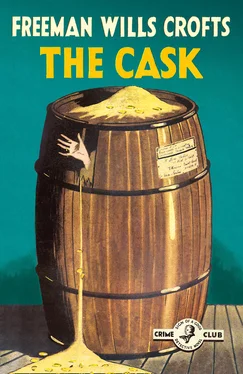


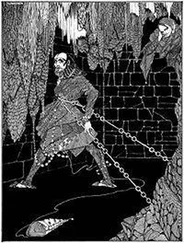

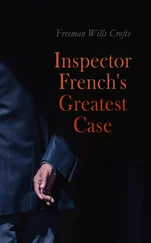
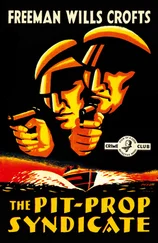
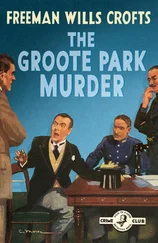
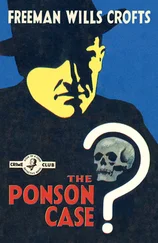
![Theresa Cheung - The Dream Dictionary from A to Z [Revised edition] - The Ultimate A–Z to Interpret the Secrets of Your Dreams](/books/692092/theresa-cheung-the-dream-dictionary-from-a-to-z-r-thumb.webp)

